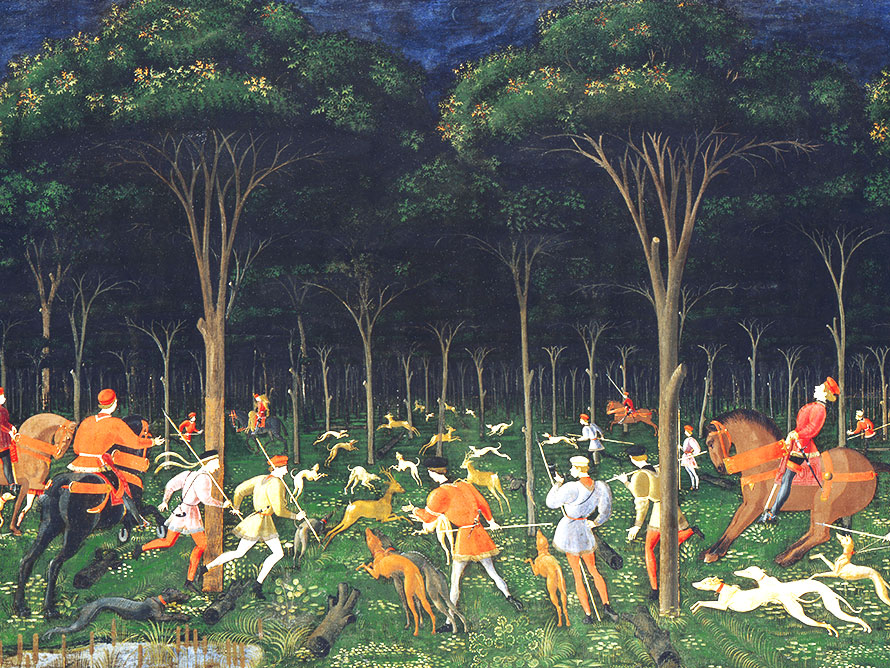Should we plant more forests? The UK government has backed a project to create a vast green band across England. Reforestation is popular with environmentalists, but it has its critics.
Clash of the conservationists over new forest
Should we plant more forests? The UK government has backed a project to create a vast green band across England. Reforestation is popular with environmentalists, but it has its critics.
It is said that in the Middle Ages, a squirrelThis is probably a myth. The 11th-century Domesday Book recorded forest cover in England as 15% - little more than today. could cross Britain without ever touching the ground. Today, it would be lucky to find a few miles of the continuous canopy.
The government hopes to change that. Last week, it unveiled plans to plant a forest stretching from coast to coast across Northern England - one of the country's least wooded regions.
Covering existing woodland as well as private land, the Northern Forest will feature 50m new trees, to be planted over 25 years. The green ribbon will surround major cities like Manchester and Leeds. This will cost an estimated 500m, of which the government has only promised to pay 5.7m; the rest will have to come from charities.
Supporters of reforestationThe planting of trees on recently forested land. When the land has not seen forest for ages, the term is "afforestation". list various benefits. Some are environmental: trees foster biodiversity, defend against floodsTrees are surrounded by deep soil that can absorb a lot of water. But reforestation's effect on flooding has not been conclusively proven. See The Conversation's article in Become An Expert., and combat global warming by absorbing carbon. Some are economic: visitors come, jobs are created. A similar project in the Midlands, the National Forest, has converted old mines and quarries into a tapestry of green.
Britain was once far leafier than it is now. Over the centuries, trees were cleared for farming. Printing, wars, and the Industrial Revolution all required masses of timber, and woodland cover hit a low a century ago. It has since climbed to around 13% - still lower than all EU countries bar Ireland. Finland is almost three-quarters forest.
Notwithstanding the National Forest, reforestation in the UK is slowing. Last year saw the lowest level of planting in England for years, according to the Woodland TrustThe UK's largest woodland conservation charity, and the leader of the Northern Forest project.. Meanwhile, ancient forests are being threatened by developments like the HS2 rail lineThe most expensive rail network in UK history will link London, the Midlands and the North. According to the Woodland Trust, the project threatens 98 ancient woods. and frackingA method of extracting of gas and oil from underground rocks. Fracking firms have been given permission to conduct surveys in protected woodland, despite fears about the technology's environmental impact..
But while deforestation is generally met with fierce opposition from campaigners, not everybody agrees that reforestation is the answer. Research has challenged some of its supposed advantages - such as its usefulness in fighting global warming (see Qu0026amp;A).
Should we have more projects like the Northern Forest, or fewer?
Fewer, say some. We need forests, but the government should focus on saving the ones we have already, with their rich wildlife and beautiful old trees. Meanwhile, with the right approach, we can let new woodland grow by itself. Reforestation programmes are expensive and intrusive. Their benefits aren't even proven beyond doubt. Let's ditch them.
More, reply others. Projects like these can revitalise an area: the National Forest, for example, is very popular with locals. The benefits of woodland outweigh the drawbacks, whatever the naysayers say. Fighting deforestation is crucial too, but that is not an argument against reforestation. If Britain is to catch up with its neighbours, we need both.
Keywords
Squirrel - This is probably a myth. The 11th-century Domesday Book recorded forest cover in England as 15% - little more than today.
Reforestation - The planting of trees on recently forested land. When the land has not seen forest for ages, the term is "afforestation".
Defend against floods - Trees are surrounded by deep soil that can absorb a lot of water. But reforestation's effect on flooding has not been conclusively proven. See The Conversation's article in Become An Expert.
The Woodland Trust - The UK's largest woodland conservation charity, and the leader of the Northern Forest project.
HS2 rail line - The most expensive rail network in UK history will link London, the Midlands and the North. According to the Woodland Trust, the project threatens 98 ancient woods.
Fracking - A method of extracting of gas and oil from underground rocks. Fracking firms have been given permission to conduct surveys in protected woodland, despite fears about the technology's environmental impact.
Clash of the conservationists over new forest

Glossary
Squirrel - This is probably a myth. The 11th-century Domesday Book recorded forest cover in England as 15% - little more than today.
Reforestation - The planting of trees on recently forested land. When the land has not seen forest for ages, the term is "afforestation".
Defend against floods - Trees are surrounded by deep soil that can absorb a lot of water. But reforestation's effect on flooding has not been conclusively proven. See The Conversation's article in Become An Expert.
The Woodland Trust - The UK's largest woodland conservation charity, and the leader of the Northern Forest project.
HS2 rail line - The most expensive rail network in UK history will link London, the Midlands and the North. According to the Woodland Trust, the project threatens 98 ancient woods.
Fracking - A method of extracting of gas and oil from underground rocks. Fracking firms have been given permission to conduct surveys in protected woodland, despite fears about the technology's environmental impact.
